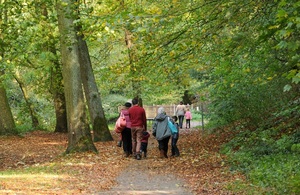Survey reveals inequality in children spending time outside during pandemic
New People and Nature Survey reveals clear inequalities for children engaging with nature.

Children walking in nature. Credit: Natural England.
Natural England’s ‘People and Nature Survey (children)’, released today (14 October), has revealed clear inequalities for children engaging with nature, with 71% of children from ethnic minority backgrounds reporting spending less time outside since coronavirus compared with 57% of white children.
In addition, almost three-quarters (73%) of children from households with a total annual income below £17,000 spent less time outdoors, compared with 57% from households with an annual income above £17,000.
The survey also reveals six in ten children reported they have spent less time outdoors since the start of the coronavirus pandemic, with concern about catching or spreading coronavirus the biggest barrier stopping them going out more.
The positive role of nature in supporting well-being has also been revealed, with eight in ten children agreeing that being in nature made them very happy, while 70% said that they want to spend more time outdoors with friends post-pandemic.
These findings build on Natural England’s latest People and Nature Survey, which reveal that the nation’s gardens, parks, woodlands and rivers have played a huge part in helping with their mental health during the coronavirus pandemic, with almost nine in ten of adults in England reporting that being in nature makes them very happy.
Marian Spain, Chief Executive of Natural England, said:
Children are telling us just how important time in nature is to their happiness and this backs up a strong weight of scientific evidence showing how essential nature is to all of our physical health and our mental wellbeing. Today’s figures paint a stark picture of inequality of access to nature with children from our poorest families and those from ethnic minority backgrounds least likely to be able to enjoy those wellbeing benefits.
Addressing these inequalities must be a central part of a green recovery from the coronavirus. Natural England is committed to playing our part in making that happen, and our work on green infrastructure standards and pilots will increase the amount of nature-rich places close to where children live and play as part of a thriving nature recovery network. We are also working with partners to embed the use of green social prescribing to improve mental health and wellbeing for all.
The joint DfE, Natural England and Defra ‘Children and Nature programme’ is already working with children from disadvantaged backgrounds to have better access to natural environments to support their mental health and wellbeing and engagement with school. Three independent projects are providing greener grounds and pupil visits to green spaces for schools with the highest proportion of disadvantaged pupils, scaling-up care farming services (the therapeutic use of farming practices) for children and adults facing disadvantage or social exclusion and expanding community forest and woodland outreach activities being delivered to school children, particularly those in disadvantaged areas.
The completion of the England Coast Path will offer families increased opportunities to enjoy England’s fantastic coastline and the health and wellbeing benefits that brings, and the Countryside Code refresh will be a major vehicle to help children feel safe and enjoy the countryside.
The Government’s 25 Year Environment Plan has set out how all parts of society should be connected with green spaces to improve health and wellbeing. Natural England is working with Defra and other partners to deliver the plan’s commitment for more good quality green space that provides benefits for health, nature, climate and prosperity, in particular for disadvantaged urban communities, and to help the country recover from coronavirus by ensuring green space is available to all.
Additional background
- The People and Nature Survey for England, led by Natural England, is the government’s main source of data on how people experience and think about the environment.
- The People and Nature Survey for England: Children’s survey was commissioned to ask 1,500 children and young people (aged 8-15) directly about their experiences in nature. This was carried out by Kantar, on-line using their Lighspeed panel and ran continuously between 6th-18th August 2020 (inclusive).
- The full report and associated datasets can be found on these pages: People and Nature Survey for England. The questionnaire can be found here.